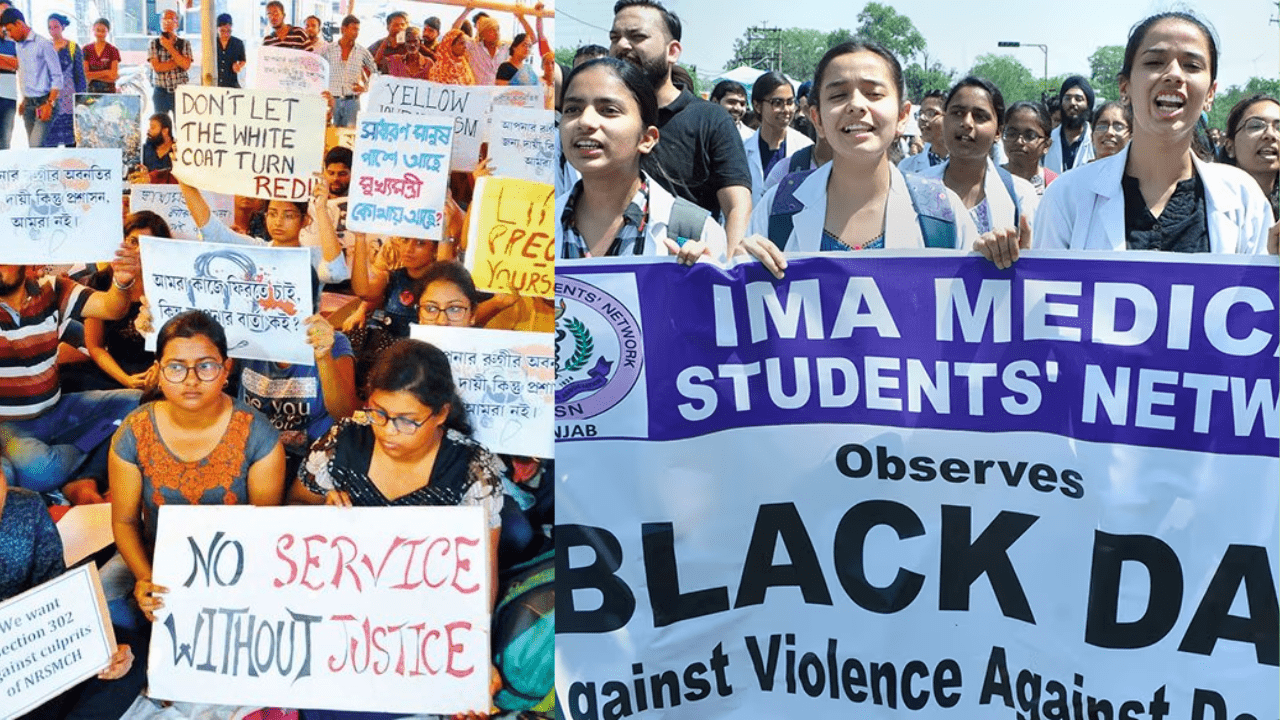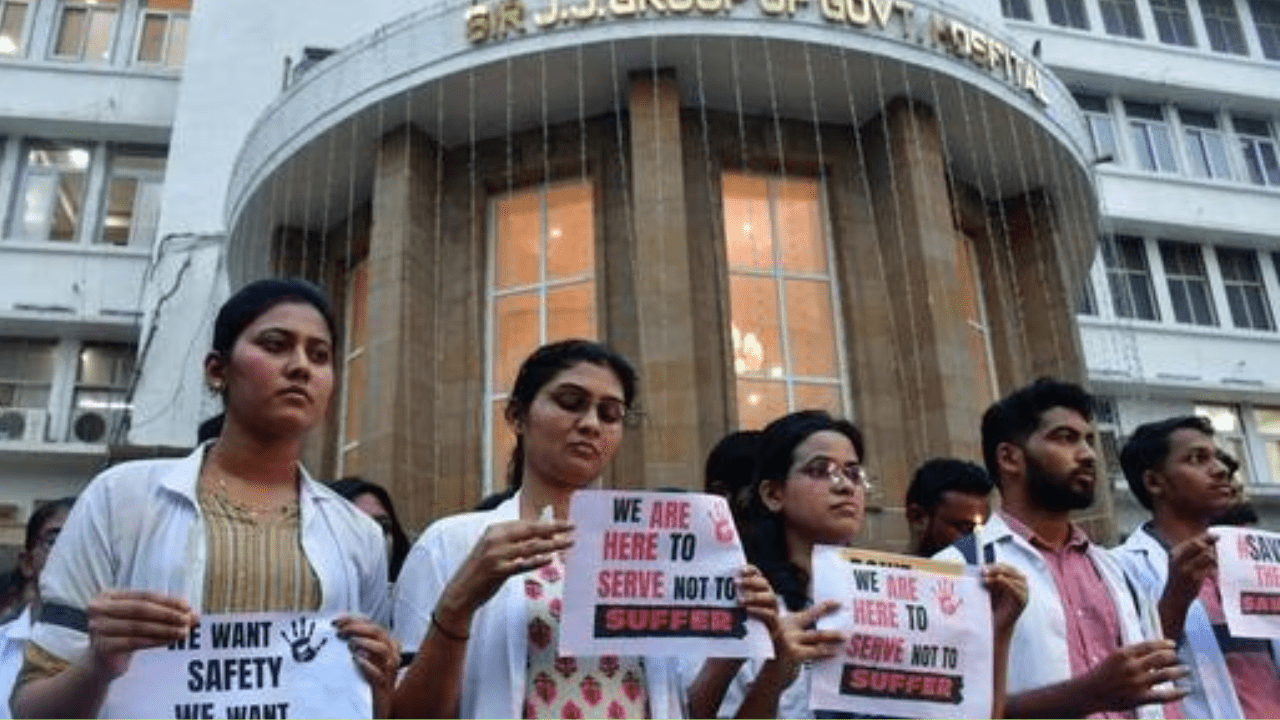The tragic death of a doctor in Kolkata has sparked nationwide doctors protest, with doctors demanding a central law to curb violence against healthcare workers.

The tragic death of a 31-year-old doctor at Kolkata’s RG Kar Medical College and Hospital has ignited a wave of protests across India, with doctors refusing to return to work except for emergency procedures. This incident, which involved the rape and murder of a female doctor on duty, has highlighted the growing crisis of violence against healthcare workers in the country. The Indian Medical Association (IMA) and the Federation of Resident Doctors’ Association (FORDA) have both stepped in, demanding immediate action from the government.
The doctors protest in India has significantly disrupted medical services nationwide, as healthcare professionals call for a central law to curb attacks and violence against them. This blog post explores the incident, the demands of the doctors, the impact on healthcare services, and the broader implications for India’s healthcare system.
The Kolkata Tragedy: A Grim Reminder of the Risks Faced by Healthcare Workers
A 31-year-old doctor was brutally raped and murdered while on duty at Kolkata’s RG Kar Medical College and Hospital. This horrific event has not only shaken the medical community but has also brought to light the alarming frequency of violence against healthcare workers in India. Such incidents are not isolated; they are part of a growing trend that has been exacerbated by the pressures of the healthcare system and the lack of adequate security measures.
FORDA, representing the resident doctors across the country, has described the Kolkata incident as “perhaps the greatest travesty to have occurred in the history of the resident doctor community.” The association has demanded the resignation of all authorities who failed to protect the dignity and life of the on-duty doctor. They have also sought assurances that the protesting doctors will not be manhandled and that swift legal action will be taken against those responsible for the crime.
The Demand for a Central Law: Protecting Healthcare Workers
The Indian Medical Association has officially requested Health Minister JP Nadda to enact a central law aimed at curbing the rising violence against doctors. The association argues that existing state-level laws are insufficient and that a strong, centrally-enforced legal framework is needed to protect healthcare workers. The IMA’s demand includes the implementation of security protocols that would mandate the presence of security personnel in hospitals, especially in sensitive areas like emergency rooms and intensive care units.
In its letter to the Health Minister, the IMA emphasized that the safety of doctors and healthcare workers is paramount to ensuring that they can perform their duties without fear of assault. The association’s demand for a central law has gained widespread support from the medical community, which views such legislation as essential for their safety and the overall functioning of the healthcare system.

The Impact of Nationwide Doctors Protest: Disruption of Healthcare Services
The nationwide protest has led to a significant disruption of healthcare services across the country. In Kolkata, treatment at most hospitals has been severely affected, with several patients and their relatives expressing frustration over the inconvenience caused by the strike. The situation is no different in other parts of the country, where doctors have joined the protest in solidarity with their colleagues in Kolkata.
In Mumbai, doctors from prominent hospitals like JJ Hospital, Sion Hospital, Nair Hospital, and King Edward Memorial Hospital have also participated in the protest. These hospitals are among the busiest in the city, and the absence of doctors has led to a considerable reduction in the number of surgeries and patient admissions.
At AIIMS Delhi, one of India’s premier medical institutions, the strike has resulted in an 80 percent reduction in daily surgeries and a 35 percent drop in admissions. The hospital administration has issued a circular asking doctors to return to work, citing a High Court order that prohibits doctors from participating in protests on hospital premises. However, the doctors have remained resolute, refusing to back down until their demands are met.
The Broader Implications: A Call for Reform in the Healthcare System
The doctors’ protest is not just a response to the tragic incident in Kolkata; it is a call for comprehensive reform in the way healthcare workers are treated and protected in India. The frequent incidents of violence against doctors are symptomatic of a larger problem within the healthcare system—one that includes inadequate infrastructure, overworked staff, and a lack of proper security measures.
The protest has brought attention to the urgent need for the government to address these issues through policy changes and the implementation of stricter laws. The enactment of a central law to protect healthcare workers would be a significant step in the right direction, but it must be accompanied by broader reforms that address the root causes of violence in hospitals.
Moving Forward: Ensuring the Safety of Healthcare Workers
As the doctors’ protest continues, it is clear that the medical community will not be satisfied with anything less than a strong and enforceable central law that guarantees their safety. The government must act swiftly to address the concerns of healthcare workers and ensure that such a tragedy never occurs again.
The incident in Kolkata has served as a wake-up call for the nation. It is a reminder that the safety of those who dedicate their lives to saving others must be a top priority. The enactment of a central law to protect healthcare workers, along with the implementation of security protocols, is essential for restoring the confidence of doctors and ensuring the smooth functioning of India’s healthcare system.
In a Nutshell
The nationwide doctors’ protest is a powerful statement against the violence and threats faced by healthcare workers in India. The tragic incident in Kolkata has galvanized the medical community, leading to widespread demands for stronger legal protections and security measures. As the country grapples with this crisis, it is imperative that the government takes decisive action to protect its doctors and ensure that they can continue to serve the nation without fear.
Read Next:

The Psychology of Love: Why Valentines Day Matters More Epic Than You Think
Discover the psychology of love and why Valentines Day is more important than you think. Learn how love impacts the brain, strengthens relationships, and boosts

Premier League Highlights: Arsenal Humiliate Man City 5-1, Spurs and Palace Secure Crucial Wins
Arsenal demolished Manchester City 5-1 in a statement premier league highlights win, reigniting their title hopes. Meanwhile, Crystal Palace stunned Man United 2-0, and Tottenham

How Budget 2025 Impacts the Indian Middle-Class: Major Tax Benefits and Glaring Omissions
Budget 2025 offers major tax relief to the middle class, including zero tax on incomes up to ₹12 lakh. However, it misses out on incentives

Degrees vs Employability: Why “Highly Qualified Degree Holders” Struggle to Find Jobs While “Less Qualified Individuals” Get Hired Faster!
Many highly qualified individuals struggle to secure jobs, while less qualified candidates get hired quickly. This Degrees vs Employability paradox is caused by employer preferences,

The Power of Mindset: Why Looking Poor Doesn’t Make You Poor, but Thinking Poor Does!
Discover why looking poor doesn’t define your wealth but thinking poor does. Learn the power of mindset and how a growth-oriented mindset can lead to

Overthinking: How It’s Damaging Today’s Youth – Causes and Cure in 2025
Understanding how overthinking is silently damaging today’s youth, from its causes rooted in societal pressure and social media to its long-term effects on mental health.
